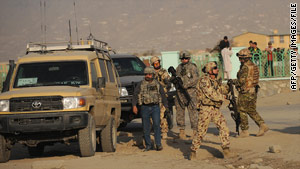Scammer
Banned

NATO troops arrive at the scene of a suicide attack last week in Kabul, Afghanistan.
Lisbon, Portugal -- The U.S. and NATO allies are looking to turn two or three Afghanistan provinces over to Afghan control by June of next year, with "several more" in the in the summer or fall, according to a senior NATO official.
While the plan is still a rough estimate of transition, the picture of how Afghans will begin to take over security by as early as March 2011 in some areas is beginning to emerge as NATO leaders and Afghan President Hamid Karzai meet in Lisbon for meetings on the war.
Officials say there is no set goal to define "success," but the expectation is that some provinces would be handed over even before the U.S. deadline to begin removing some troops from Afghanistan.
Some those targeted for first transition include the relatively calm provinces of Parwan, Bamiyan, Panjshir, CNN Pentagon Correspondent Barbara Starr reported earlier this week.
"We've identified several small clusters of provinces" that would be turned over in order of their readiness, a NATO official in Lisbon said Friday.
Ahead of the turnover, NATO forces will likely add troops and equipment in an effort to jolt them into readiness.
"As some of these provinces are identified as eligible for transition, we may temporarily pour extra resources into those areas. It would be to help plug any gaps, and sort of push them over the tipping point," a senior defense official said. He mentioned money, manpower and other resources as things that could be sent in temporarily.
A part of the transition planning is "adjusting the threshold" for what areas are ready to transition, according to a U.S. official.
The official said that in some parts of Afghanistan, like the heavily fought areas in the east, the threshold for transition could be lowered for consideration of handover. The operating phrase, the official said, is "Afghan good enough?"
The criteria for a handover is being presented to NATO leaders in Lisbon, a senior NATO official said.
Readiness for transition will be assessed on a number of fronts including security, resilience of the local government, resolution of significant tribal disputes, no concern of a warlord who will try to assert control over the local government and a check on corruption, the official said.
The process of moving a province from control of international forces to local control could take between 18 months and two years.
Security transfer will be conducted in a very similar process as the Balkans and Iraq, according to a senior NATO official.
The official explained that the strategy starts with partnering and then mentoring, before moving to a tactical over-watch where Afghans do the operations while NATO forces observe. The final two steps is limited to Afghans planing while NATO observes and consults and, then finally, where the NATO involvement is mostly limited to helping plan strategy but the Afghans are ready to independently plan and conduct the operations.
The transition planning is not just about security, but rather "for all functions of government, security and governance and development," said the official.
Some of initial provinces to be handed over are being described as a "pilot program" but the understanding is that once handed over, the process is not reversible, the official said. No announcement will be made until the transition process is under way.
Neither NATO nor the Afghan government will have unilateral decision-making power, when it comes to deciding which provinces are handed back to Afghan control, the senior defense official said. That decision has to be worked out within a committee made up of NATO allies and Afghans.
The meetings in Lisbon will aim for a long term agreement to be signed by NATO countries and Afghanistan that will spell out "long-term participation" by NATO in Afghanistan, according to another senior NATO official.
"We all know Afghanistan is going to need our support for many years to come," the official said.
One area they will need long-term support is training and paying for the 300,000 security forces that will be recruited and trained over the next few years. The senior NATO official said that Afghanistan will not be able to pay for those forces on its own until 2023.
"We want to be able to fund this," the official said.
